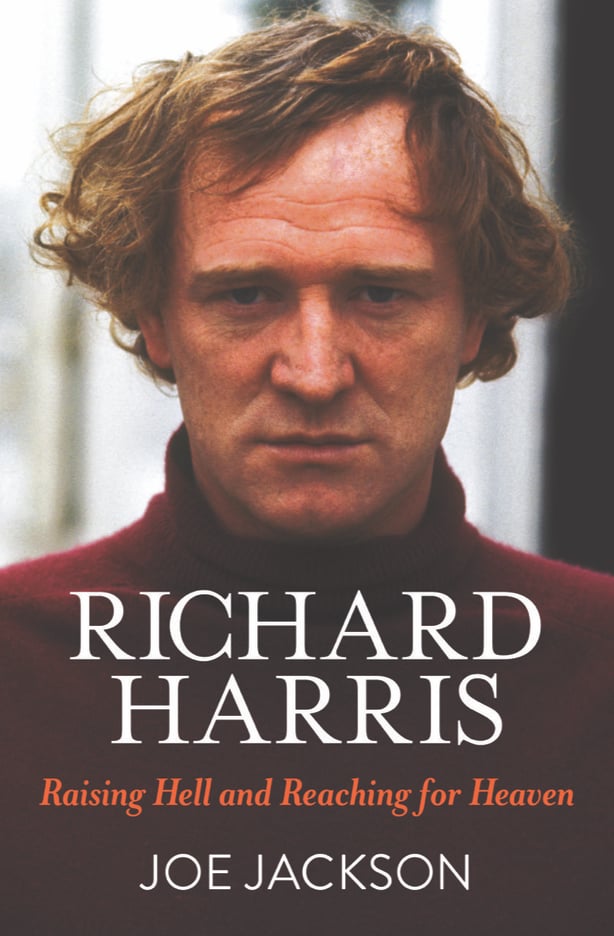We present an extract from Raising Hell and Reaching for Heaven, the new biography of actor Richard Harris, written by Joe Jackson.
In 1987, when Richard Harris – the legendary star of This Sporting Life, The Field and Harry Potter and the Philosopher's Stone – was interviewed for the first time by Joe Jackson, they almost came to blows. Jackson was determined to unearth deeper truths about the actor than he usually disclosed during interviews. Harris had manipulated the media all his life, largely to keep people from getting to really know him. By the time that interview ended, they had become firm friends. It was only then that Jackson told Harris, 'I want to show the public that there is far more to you than your superficial image as a boozing, brawling womaniser.’ Harris loved this idea and two years later he asked Jackson to write his biography. Richard Harris: Raising Hell and Reaching for Heaven is that book.
Jimmy Webb has since said he wrote Didn't We about Susan Horton, the inspiration behind some of his greatest sixties songs such as By the Time I Get to Phoenix, and Where’s the Playground, Susie and Hymns from Grand Terrace. She also was the inspiration behind MacArthur Park. Originally conceived as part of an eighteen-minute cantata, Webb wanted the Association to include it, as a complete side of their album, Renaissance. They rejected it, and Webb extracted from the cantata its movement, MacArthur Park. Since Harris’s version was released in 1968, many people have misunderstood, mocked and dismissed the ‘cake in the rain bit’ as psychedelic, probably drug-induced nonsense. It is not. At all.
On the contrary, the lyric reflects Webb’s lived reality. Susan Horton worked in an insurance company across the street from MacArthur Park in the Westlake District of Los Angeles, named after General Douglas MacArthur. She and Webb often met there for lunch. But Jimmy loved Susan more than she loved him. He even dreamed of marrying her. And after their love affair ended, Webb would revisit that park, look at old men playing checkers, think of the yellow cotton dress Susan had worn, see families slicing cakes, and sometimes see, getting soaked in the rain, slices families had left behind after picnics. Simple as that. And this is what Jimmy wrote about in a poem that he then set to music and called MacArthur Park.
We need your consent to load this rte-player contentWe use rte-player to manage extra content that can set cookies on your device and collect data about your activity. Please review their details and accept them to load the content.Manage Preferences
Listen: Biographer Joe Jackson talks to Miriam O'Callaghan
Webb recorded the backing track for it and all tracks on A Tramp Shining – he also arranged all tracks and played keyboards on some –with the legendary ‘wrecking crew’ in LA. They were the elite among LA session musicians and had worked with the likes of Elvis and Sinatra and laid down backing tracks for Pet Sounds with Brian Wilson while the Beach Boys were on tour. They included Carol Kaye, Tommy Tedesco, Glen Campbell, James Burton and Barney Kessel on guitars, Dr John, Leon Russell, Don Randi and Larry Knechtel on keyboards, Hal Blaine and Earl Palmer on drums, Joe Osborn and Lyle Ritz on bass, and Plas Johnson on sax.
Richard Harris then laid down his vocal in London’s Lansdowne Road Studio over Christmas 1967. He loved, in particular, the middle section of MacArthur Park. The moment Harris heard that section, he was hooked. Harris thought to himself, ‘That’s my life.’ But he had to fight Jimmy Webb to allow him to record not just the middle section but the entire song.
‘And let me tell you that Jimmy Webb can thank me that MacArthur Park was recorded at all!’ Richard said in 2001. Harris had a love/hate relationship with Webb, as is clear from some of his sideswipes at the songwriter. Webb, over time, became as ambivalent about him.
Watch: Richard Harris performs MacArthur Park live
‘I don’t care what he claims now, and I know he’s an ego-maniac, but at first, he would not let me record the song, and I insisted, in the strongest possible manner, that I wanted to record MacArthur Park. He told me that story about the Association turning it down and laughing at it. But I said, "If I do the album, I am going to sing this song." He said, "You can’t do it," and said that in a way that suggested he believed I couldn’t do it, as in, sing the thing. But I was adamant. We fought about that for ages, and he can be as stubborn as I am. So finally, I made a deal with Jim. I would do the whole song, and if I couldn’t pull it off, we would release only the middle section. If I sing the early bits, which he seemed to think I couldn’t, and I sing them as well as the middle section, we would release it all. And just like I didn’t want to let down the fantastic Warner Brothers orchestra when I recorded songs from Camelot, I didn’t want to let down the musicians who made those wonderful backing tracks or Webb. So, I put my heart and soul into MacArthur Park. But even as I sang it, I knew I was getting inside the song. So did Jim. Everyone realised I nailed it.’

Raising Hell and Reaching for Heaven is published by Merrion Press

